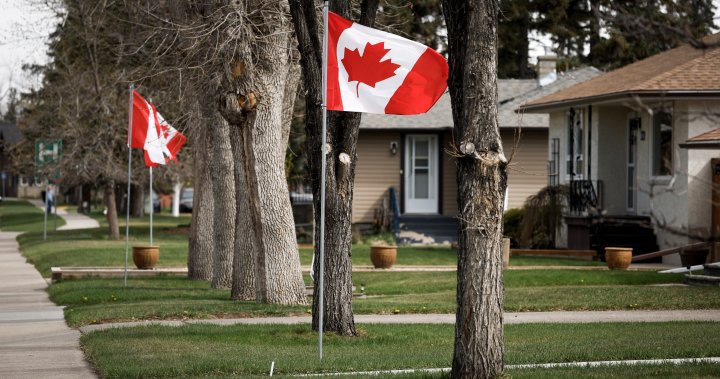A majority of Canadians were feeling hopeful about unity and economic opportunities in the country last year, new data from Statistics Canada shows this week.
But that was before the U.S. trade war began, and it’s not clear whether those numbers are holding strong, with Statistics Canada saying the data can still serve as a “useful baseline” even if it was compiled before the current challenges and tensions with the U.S.
The data, part of a series of economic and social reports released Wednesday, found that one year ago, 73 per cent of Canadians said they felt warm or “very warm” towards their fellow Canadians in general, while another 21 per cent held neutral feelings and six per cent felt cold towards others.
Overall, a total of 82 per cent of Canadians said they were hopeful about unity, with 75 per cent saying they had hope for economic opportunities in the country.
Of those who held very warm feelings, the data showed 91 per cent felt hopeful about unity among Canadians, with 83 per cent of those holding general expressions of warmth sharing the same hope.

Get daily National news
Get the day’s top news, political, economic, and current affairs headlines, delivered to your inbox once a day.
Those with more neutral or cold feelings, however, still showed a high likelihood of hope for unity at 72 per cent and 59 per cent, respectively.
How much hope they had towards unity, however, depended on their feelings toward other Canadians.
But that hopefulness can falter depending on factors like financial difficulties, the data shows, raising questions about whether the numbers reflect current moods among Canadians as affordability and recession fears continue.
Nearly all those who said their household was able to easily meet their financial needs in the prior 12 months, 89 per cent, said they were hopeful for unity, while 72 per cent of those who said they were having difficulty expressed that same hopefulness.

When it comes to health, 84 per cent of those in excellent, good or very good health said they were hopeful, but that dropped to 75 per cent of those in fair or poor health.
Similar numbers were also reported in those who may have experienced discrimination, with 76 per cent saying they were hopeful, but that grew to 85 per cent if they had not experienced discrimination.
In addition, Statistics Canada’s data breaks down how Canadians feel towards others with similar and different political views than their own, finding most have either neutral or warm feelings regardless of those views.
The biggest share, 32 per cent, said they held neutral feelings towards people with similar and different political views, while 27 per cent expressed warm feelings. Only two per cent said they felt warmth towards those with similar political views, yet cold towards people with a different perspective.
However, 24 per cent of Canadians who had very warm feelings towards people with similar perspectives on racism had very cold feelings towards people with a different opinion. Similarly, 15 per cent had negative opinions of those whose views differed from themselves on gender identity.
© 2025 Global News, a division of Corus Entertainment Inc.






